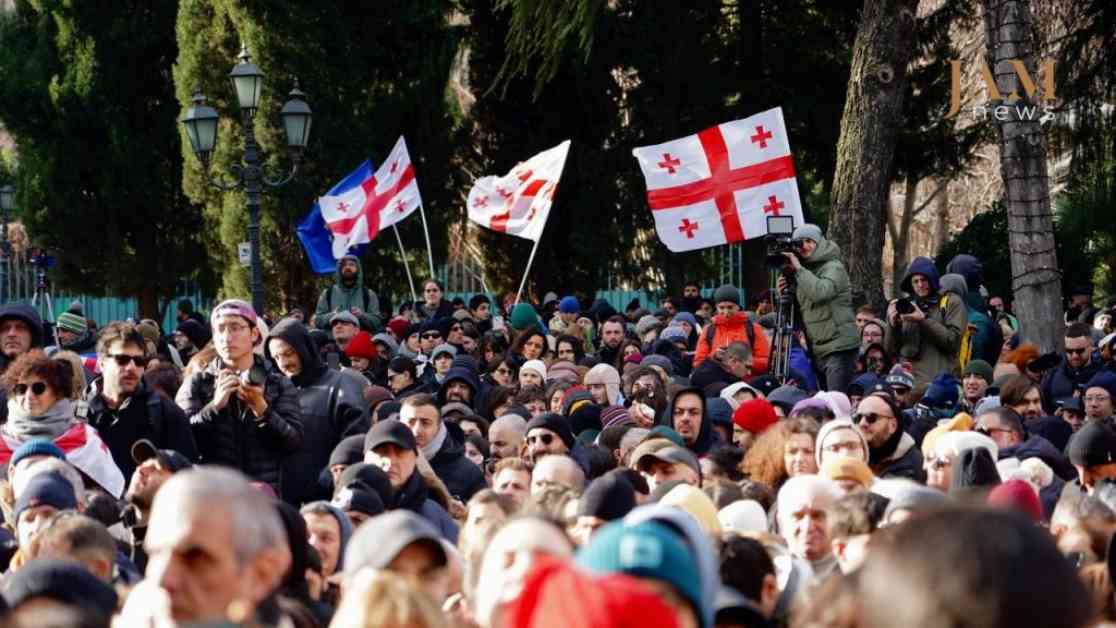Impact of Georgia’s Pro-Western President Leaving Palace on Protests
Georgia is currently experiencing a historical moment that has the potential to change the political landscape of the country. The month-long protests in Georgia are not just another event but hold the power to end the decade-long rule of the Georgian Dream party. Unlike previous protests, this wave of demonstrations has brought together a unique alliance of public outcry, resistance from the business sector, and international sanctions, leaving the government isolated and under increasing pressure.
The crisis escalated on 29 December as President Salome Zourabichvili, who is considered the legitimate president by 46% of Georgians, made a significant move by leaving her residence. She declared her intention to continue serving as president until new parliamentary elections are conducted. In response, the ruling Georgian Dream party, whose legitimacy is doubted by 61% of Georgians, swiftly installed their own president, former football player Mikheil Kavelashvili, who is recognized by only 22% of the population.
This shift in power dynamics has not quelled the momentum of the protests but rather highlighted the deepening divide between a government clinging to authority and a populace demanding change. The departure of President Zourabichvili, who referred to herself as the sole remaining legitimate institution, raises questions about the future of Georgia and the path it will take moving forward.
How the crisis in Georgia unfolded
The immediate trigger for the ongoing protests was the Georgian Dream party’s decision to suspend EU integration on 28 November. While officially a temporary suspension until 2028, the move was seen as a permanent departure from the European path by many Georgians. This decision was met with widespread discontent, as the majority of the population strongly supports EU integration.
The Georgian Dream party’s rule, believed to be influenced by the Kremlin, has been a subject of concern. The party’s success in maintaining power through deceptive means became evident when they revealed their pro-Russian stance after capturing all state institutions. The adoption of repressive laws and electoral manipulation further fueled public outrage and led to the current wave of protests.
How are these protests different?
Unlike previous demonstrations, the current protests in Georgia have seen widespread participation across various cities and towns, reflecting a unified sense of anger and resistance against the government. The crackdown on protesters by the authorities, marked by unprecedented police violence, only served to galvanize broader opposition and unite diverse groups against the regime.
The protests have not only strengthened the unity and confidence of the Georgian people but have also isolated the ruling regime both domestically and internationally. The movement has garnered support from various sectors of society, including businesses, media, and diplomatic circles, leading to widespread calls for new elections and sanctions against the government.
What’s next after 29 December?
As Georgia navigates through this critical period of political upheaval, the focus remains on the potential collapse of the ruling regime and the prospect of new elections. President Zourabichvili’s decision to vacate the Presidential Residence, while criticized by some, may serve as a strategic move to de-escalate tensions and pave the way for diplomatic efforts to resolve the crisis.
The road ahead for Georgia involves sustained pressure from within and support from international allies to ensure a peaceful transition of power and the establishment of democratic norms. The resilience and determination of the Georgian people, coupled with growing international solidarity, offer hope for a positive outcome in the face of ongoing challenges.
In conclusion, Georgia stands at a crossroads where the aspirations of the people for freedom and democracy intersect with the need for systemic change and accountability. The events unfolding in the country underscore the power of collective action and the resilience of a nation determined to shape its own destiny.

















